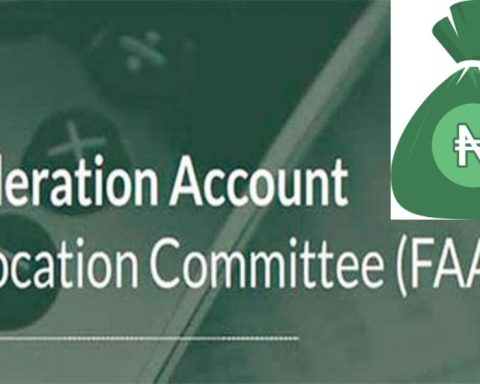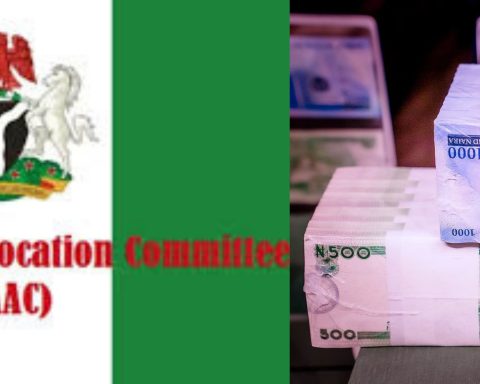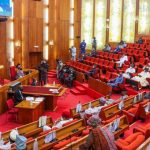The Federation Account Allocation Committee (FAAC) has shared a total of ₦2.103 trillion among the federal, state, and local governments as federation revenue for September 2025, representing a decline of ₦122 billion compared to the ₦2.225 trillion disbursed in August.
The allocation, drawn from a gross total revenue of ₦3.054 trillion, was made during the October 2025 FAAC meeting in Abuja, chaired by the Accountant-General of the Federation, Shamsudeen Ogunjimi.
According to a communiqué issued after the meeting and signed by Mohammed Manga, Director of Information and Public Relations at the Federal Ministry of Finance, the latest disbursement reflects lower statutory and oil revenue performance compared to the previous month.
Join our WhatsApp ChannelRevenue Decline Across Key Streams
The gross revenue of ₦3.054 trillion for September was ₦581 billion lower than the ₦3.635 trillion recorded in August. No official explanation was immediately given for the shortfall.
The communiqué, however, indicated that Value Added Tax (VAT), Import Duty, and Electronic Money Transfer Levy (EMTL) collections rose significantly, while Company Income Tax (CIT), Common External Tariff (CET) levies, Oil and Gas Royalties, and Excise Duties declined during the period.
Petroleum Profit Tax (PPT) also increased marginally.
Distributable Revenue Composition
The total ₦2.103 trillion distributable revenue for September comprised allocations from Gross Statutory Revenue, Value Added Tax (VAT), and Electronic Money Transfer Levy (EMTL), alongside Transfers, Interventions, and Refunds.
Breakdown:
Federal Government: ₦711.314 billion
36 States: ₦727.170 billion
774 Local Government Councils: ₦529.954 billion
Oil-producing states (13% derivation): ₦134.956 billion
Additionally, ₦116.149 billion was set aside for the cost of collection, while ₦835.005 billion was allocated for Transfers, Interventions, and Refunds.
READ ALSO : FAAC: South-south Region Emerges Top, Receives ₦1.56trn Allocation In Six Months
FAAC Disburses N2.001trn July Revenue To FG, States, LGAs
Statutory Revenue Drops Sharply
The Gross Statutory Revenue stood at ₦2.128 trillion, down by ₦710.134 billion from ₦2.838 trillion in August.
From this amount:
₦79.090 billion was deducted for the cost of collection.
₦809.873 billion was earmarked for Transfers, Interventions, and Refunds.
The remaining ₦1.239 trillion was shared as follows:
Federal Government: ₦581.672 billion
States: ₦295.032 billion
Local Governments: ₦227.457 billion
13% Derivation (mineral-producing states): ₦134.956 billion
VAT Rises to ₦872.63bn
The Gross VAT revenue for September was ₦872.630 billion, up from ₦722.619 billion recorded in August an increase of ₦150.011 billion.
From this figure:
₦34.905 billion was deducted for collection costs,
₦25.132 billion for Transfers and Refunds,
Leaving ₦812.593 billion for distribution to the three tiers of government.
Out of the distributable VAT:
Federal Government: ₦121.889 billion
States: ₦406.297 billion
Local Governments: ₦284.408 billion
Electronic Money Transfer Levy (EMTL)
The EMTL revenue for the month stood at ₦53.838 billion, distributed as follows:
Federal Government: ₦7.753 billion
States: ₦25.842 billion
Local Governments: ₦18.089 billion
Cost of Collection: ₦2.154 billion
Key Notes
Total Disbursement: ₦2.103 trillion (down ₦122 billion from August’s ₦2.225 trillion)
Gross Revenue: ₦3.054 trillion (down ₦581 billion from August’s ₦3.635 trillion)
VAT Revenue: Up ₦150 billion month-on-month
Statutory Revenue: Down ₦710 billion
EMTL Revenue: ₦53.838 billion
Implications
Fiscal analysts say the drop in overall FAAC allocation underscores the volatility of Nigeria’s oil-dependent revenue profile and highlights the need for sustained reforms to strengthen non-oil revenue sources.
While the increase in VAT and EMTL collections signals improvement in non-oil performance, the sharp fall in statutory revenues could pressure state and local government budgets, especially amid rising inflation and debt obligations.
Experts urge the government to consolidate revenue administration reforms, enhance tax efficiency, and diversify export earnings to ensure fiscal stability.
Amanze Chinonye is a Staff Correspondent at Prime Business Africa, a rising star in the literary world, weaving captivating stories that transport readers to the vibrant landscapes of Nigeria and the rest of Africa. With a unique voice that blends with the newspaper's tradition and style, Chinonye's writing is a masterful exploration of the human condition, delving into themes of identity, culture, and social justice. Through her words, Chinonye paints vivid portraits of everyday African life, from the bustling markets of Nigeria's Lagos to the quiet villages of South Africa's countryside . With a keen eye for detail and a deep understanding of the complexities of Nigerian society, Chinonye's writing is both a testament to the country's rich cultural heritage and a powerful call to action for a brighter future. As a writer, Chinonye is a true storyteller, using her dexterity to educate, inspire, and uplift readers around the world.














